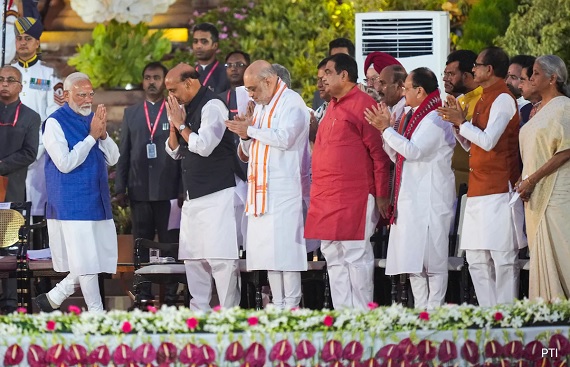Modi Begins Historic Third Term as PM with Coalition Government
By
siliconindia | Monday, 10 June 2024, 09:58:09 AM IST

In an unprecedented political development, Narendra Modi was inaugurated for a third consecutive term as Prime Minister of India, a milestone previously achieved only by Jawaharlal Nehru. The swearing-in ceremony at Rashtrapati Bhavan, attended by around 8,000 guests, included national dignitaries and leaders from seven South Asian and Indian Ocean Region countries.
Modi's arrival was marked by a dignified procession, culminating in his ascent to the dais where he acknowledged the crowd with folded hands and a respectful bow. Following the National Anthem, President Droupadi Murmu administered the Oath of Office and Secrecy to Modi, formally reinstating him as the head of the government.
This term, however, presents a significant departure from Modi's previous tenures as the Bharatiya Janata Party (BJP) failed to secure a standalone majority, winning 240 seats. The formation of the government required a coalition within the National Democratic Alliance (NDA), which collectively garnered 292 seats, well above the 272-seat majority threshold. The Telugu Desam Party (TDP) and Janata Dal-United (JD-U) played crucial roles as kingmakers, contributing 16 and 12 seats respectively after joining the NDA just before the elections.
The new Modi Ministry consists of 71 ministers, blending experienced leaders with fresh faces. The Council includes 30 Cabinet ministers, 5 Ministers of State with Independent Charge, and 36 Ministers of State. Modi praised his team on social media as a 'great blend of youth and experience', underscoring the inclusive strategy behind the ministerial selections.
Seasoned politicians such as Amit Shah, Rajnath Singh, Nirmala Sitharaman, and S. Jaishankar are expected to retain their key portfolios in Home, Defence, Finance, and External Affairs, although official announcements on portfolio allocations are pending. The Cabinet also features new and young leaders like Chirag Paswan of the Lok Janshakti Party-Ramvilas (LJP-R) and Jayant Singh of the Rashtriya Lok Dal (RLD). Additionally, prominent state leaders, including former Madhya Pradesh Chief Minister Shivraj Singh Chouhan, former Haryana CM Manohar Lal Khattar, and former Karnataka CM H.D. Kumaraswamy of the Janata Dal-Secular (JD-S), have been incorporated, indicating Modi's strategy to merge state-level expertise with national governance.
Significant changes mark the composition of the new ministry, with 32 new inductees and 35 from the previous term being excluded. Notable departures include Smriti Irani and Rajeev Chandrasekhar, who were defeated in the elections, alongside others like Anurag Thakur and Narayan Tatu Rane who were dropped despite securing victories.
In his post-ceremony remarks, Modi reiterated his commitment to improving the lives of Indian citizens, emphasizing the holistic nature of his ministerial team. As Modi embarks on his third term, his leadership promises a renewed focus on coalition dynamics and a strategic approach to governance aimed at addressing India’s multifaceted challenges while fostering continuity and growth.
Read More News :
Stocks to Monitor: Dr Reddy's, Mphasis, IDBI Bank, Wardwizard, Dalmia Bharat
Inox Wind Incorporates Four Subsidiaries to Bolster Wind Farm Development Across India



